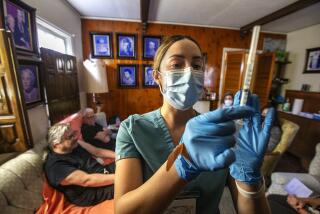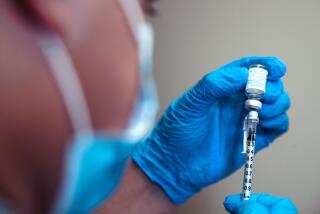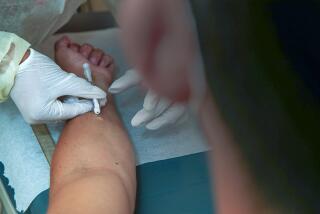Smallpox Inoculation Program Is Launched
- Share via
With 15 quick needle pricks to Rita Bagby’s left arm, Los Angeles County formally began its smallpox vaccination program Wednesday, becoming the second nonmilitary site in the nation to inoculate against the threat of a bioterrorist attack.
Bagby, a public health nurse, was one of 27 medical professionals who volunteered to be vaccinated so they can go on to immunize hospital workers or investigate suspected smallpox cases.
“I won’t say it was fun, but I can’t say it was painful,” said Bagby, of Mar Vista, at the Hollywood-Wilshire Health Center.
The first day’s turnout was about what was expected, although just a fraction of the 9,200 doses the county ordered from the federal government were put to use.
Last week, resistance to the vaccinations by organized labor apparently cut into participation by medical workers at the nation’s inaugural site in Connecticut. It is too soon to say whether the effort in Los Angeles will be hampered significantly by union opposition.
“This is an ongoing effort.... I like having smallpox vaccine in our refrigerators should there be a problem,” said Dr. Jonathan Fielding, the county’s public health director.
L.A. County’s inoculation efforts began as public health experts told a U.S. Senate committee Wednesday that the Bush administration’s smallpox vaccination program, initially targeting up to 450,000 health-care workers, is siphoning time and resources away from preparing for other forms of bioterrorism. In addition, health officials in some states have charged that the inoculation program is moving too quickly and is poorly coordinated.
Fielding said that Los Angeles County’s program is moving apace and has not shortchanged other health priorities.
He said he expects more than 60 public health personnel to be vaccinated within the next week. Next month, the county will begin inoculating hospital workers and bioterrorism response team members from other agencies. As of Wednesday afternoon, 68 hospitals in the county had agreed to offer vaccinations. Seven others declined to participate, either because they did not consider smallpox an imminent threat or had not had the time to consult their employees.
Also Wednesday, the state put in its first order for 10,000 doses of smallpox vaccine to be used in areas outside Los Angeles County, state health director Diana M. Bonta said. She expects the inoculations to begin within the next month.
Health-care labor unions in California and elsewhere have encouraged their members not to participate until several aspects of the federal program are worked out. In particular, they want the federal government to agree to compensate workers if they suffer complications from the vaccine.
Another complication is that workers are discouraged from being vaccinated if they or close relatives are pregnant, suffer from skin conditions or have immune-suppressing diseases, such as cancer or HIV, among other things.
Fielding estimated that 30% to 50% of people fall into these categories. Although the risk of significant harm from a vaccination is low, one or two people in a million die from complications; up to 52 more experience life-threatening illness.
Fielding himself is among several of the county’s top bioterrorism planners who declined the inoculations because they or family members have medical conditions that increase the risk of complications. This group also includes Dr. Laurene Mascola, chief of acute communicable disease control, and Dr. Raymond Aller, director of bioterrorism preparedness and response.
“I certainly thought it [would be] nice as the leader of the program to get the vaccine,” Aller said. “But then, I thought, no, it’s not worth the risk.”
If a smallpox case is confirmed in Los Angeles County, he added, he probably would get a vaccination.
For now, other health-care workers see the arm pricks as no big deal. Aller’s assistant director, Dr. Jessica Jones, was among those inoculated Wednesday. She wanted the protection because she is assigned to investigate rashes that doctors suspect could be smallpox.
Last year, Jones examined two such cases, which turned out to be chickenpox.
“I’m young and healthy and have no contraindications,” she said. “The risks are extremely low. You’re at a greater risk getting in your car in the morning than getting the vaccine.”
More to Read
Sign up for Essential California
The most important California stories and recommendations in your inbox every morning.
You may occasionally receive promotional content from the Los Angeles Times.













